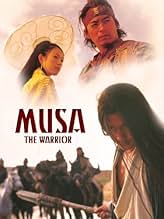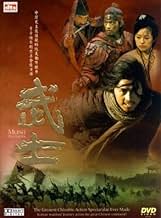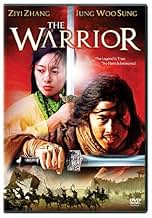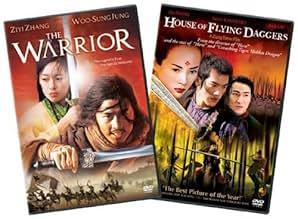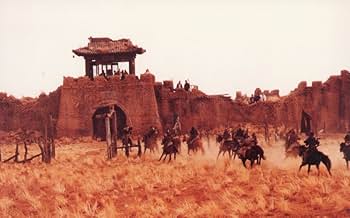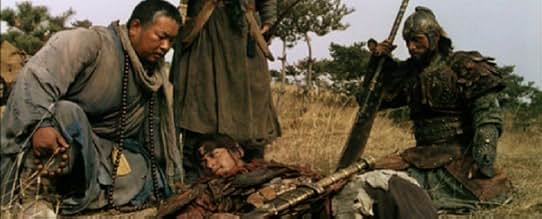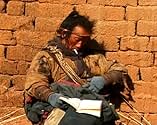1375. Nine Koryo warriors, envoys exiled by Imperial China, battle to protect a Chinese Ming Princess from Mongolian troops.1375. Nine Koryo warriors, envoys exiled by Imperial China, battle to protect a Chinese Ming Princess from Mongolian troops.1375. Nine Koryo warriors, envoys exiled by Imperial China, battle to protect a Chinese Ming Princess from Mongolian troops.
- Awards
- 6 wins & 11 nominations total
Ziyi Zhang
- Princess Bu-yong
- (as Zhang Ziyi)
Park Jeong-hak
- Ga-nam
- (as Park Jung-hak)
Jeong Mi-nam
- Yongho Soldier
- (as Mi-Nam Jung)
- Director
- Writer
- All cast & crew
- Production, box office & more at IMDbPro
Featured reviews
There is a nothing like a good epic film. Here is a fine entry to the genre from South Korea, a nation that doesn't normally make these sort of films. Film in China and staring the beautiful Zhang Ziyi it had potential.
Set in 1374 relations between Korea and the Ming Dynasty in China are at a low. The Koreans send a diplomatic mission to resort their relationship, led by General Choi-Jung (Joo Jin-mo). However when arriving in a city he team are captured and exiled from China. Left for dead in the desert their run into a Mongol army party which have captured Princess Bu-yong (Zhang Ziyi). The Korean party save her and hope to return her to Emperor, saving their mission. Within the party is Yeosol (Jung Woo-sung), a recently freed slave who was loyal to his master and excellent fighter with a spear. He and the Princess have an attraction to each other. After freeing the Princess, the Mongols are upset. There were hoping to use her as a bargaining chip against the Ming's China. They chase the Koreans and destroy countryside villages to get her back.
The story and plot are simply and believable within the context of the film; always good signs. Within the group many of characters and relationships are developed, especially Yeosol, the General, the Princess and Jinlip, the veteran of the group. Even the main bad guy has some nobility about him. The costumes and weaponry are excellently done. The warfare was brutal and shows woman and children getting killed, something that rarely happens in Hollywood films. The film is deliciously violence. My only real problem with the film, which lets it down is the action. It is good that the action is violence, but it is so overly edited and the shaky-cam make it difficult to follow. If the action was better then the would have been even better.
If you enjoy films like the Lord of the Rings trilogy, Gladiator, Conan the Barbarian and Red Cliff, you will like this film.
Set in 1374 relations between Korea and the Ming Dynasty in China are at a low. The Koreans send a diplomatic mission to resort their relationship, led by General Choi-Jung (Joo Jin-mo). However when arriving in a city he team are captured and exiled from China. Left for dead in the desert their run into a Mongol army party which have captured Princess Bu-yong (Zhang Ziyi). The Korean party save her and hope to return her to Emperor, saving their mission. Within the party is Yeosol (Jung Woo-sung), a recently freed slave who was loyal to his master and excellent fighter with a spear. He and the Princess have an attraction to each other. After freeing the Princess, the Mongols are upset. There were hoping to use her as a bargaining chip against the Ming's China. They chase the Koreans and destroy countryside villages to get her back.
The story and plot are simply and believable within the context of the film; always good signs. Within the group many of characters and relationships are developed, especially Yeosol, the General, the Princess and Jinlip, the veteran of the group. Even the main bad guy has some nobility about him. The costumes and weaponry are excellently done. The warfare was brutal and shows woman and children getting killed, something that rarely happens in Hollywood films. The film is deliciously violence. My only real problem with the film, which lets it down is the action. It is good that the action is violence, but it is so overly edited and the shaky-cam make it difficult to follow. If the action was better then the would have been even better.
If you enjoy films like the Lord of the Rings trilogy, Gladiator, Conan the Barbarian and Red Cliff, you will like this film.
Someone insulted the Korean movie industry by stating this is one of Korea's best films. I must be honest, I couldn't get myself to see the entire movie, which is a rarity for me. By the time I decided to stop torturing myself the following had occurred in the movie.
1)The tempermental and rebellious "hero" who has a serious self control problem gets the entire ancient Korean Caravan in trouble with his psychotic propensity towards violence. The Caravan saves themselves and the hero with cunning and wit. 2)The "hero" puts the entire Caravan in jeopardy again by cutting off the head of one of the merchants. This time many Caravan members die but they still escape relatively intact. 3)The Caravan finds a way to escape from their dire situation but the "hero" puts an end to their salvation by doing something totally stupid and irrational. Again, the great leadership, solidarity, and fighting ability of the Caravan saves them from disaster.
By this time, I began to beg someone to have the senses to kill the "hero" who was getting everyone else killed with his irresponsible actions. Instead of languishing in frustration, I decided to use my remote control.
The "hero" is played by Jung Woo Sung, one of the worst, and yet one of the most popular, actors in Korea. The only characters he usually plays are the silent rebellious types who act angry all the time, probably to hide his lack of acting ability.
This was the most expensive movie made in Korea (few films have surpassed it since). Yet it was a box office bomb, and with a good reason.
1)The tempermental and rebellious "hero" who has a serious self control problem gets the entire ancient Korean Caravan in trouble with his psychotic propensity towards violence. The Caravan saves themselves and the hero with cunning and wit. 2)The "hero" puts the entire Caravan in jeopardy again by cutting off the head of one of the merchants. This time many Caravan members die but they still escape relatively intact. 3)The Caravan finds a way to escape from their dire situation but the "hero" puts an end to their salvation by doing something totally stupid and irrational. Again, the great leadership, solidarity, and fighting ability of the Caravan saves them from disaster.
By this time, I began to beg someone to have the senses to kill the "hero" who was getting everyone else killed with his irresponsible actions. Instead of languishing in frustration, I decided to use my remote control.
The "hero" is played by Jung Woo Sung, one of the worst, and yet one of the most popular, actors in Korea. The only characters he usually plays are the silent rebellious types who act angry all the time, probably to hide his lack of acting ability.
This was the most expensive movie made in Korea (few films have surpassed it since). Yet it was a box office bomb, and with a good reason.
Those who settle down to enjoy the excellent 150-odd minute Musa will be surprised at how much it suggests a Western. There's sweeping landcapes, a cross-desert ordeal; competition between villains and heros, 'stagecoach' chases, abandoned and defended forts, and 'cavalry' charges. These, as well as a strong sense of a man-having-to-do what-a-Man-has-to-do, combine to create familiarity to those who know such films as (for instance) The Alamo and Commanche Station. That's not to say that Musa has no originality, or is not strongly rooted within Korean national cinema. It contains a number of striking set pieces - notably the several pitched battle scenes, multiple characterisation, as well as some insight into the various power struggles which make up mid-fourteenth century Asian history. But at the heart of this package remain a well-tried fairy story, that of a cold Princess who must learn to swallow her pride, and of a brave servant's unrequited love.
Sung-Su Kim, who directs from his own screen play, does a very good job in drawing together his disparate group of travelling companions on a dangerous journey: a Princess, a General, a monk, soldiers, wives, a cowardly translator, a whore, etc. To provide suitable contrast between the moments of combat, he relates them in short, effective, dialogue scenes. Its good to see a film too in which the ubiquitous wire work and over the top gymnastics, beloved by some Eastern action directors, is conspicuous by its absence. Its also one where the director relies less on extreme camera angles and special effects to create visual drama than on the regular ebb and flow of dramatic editing. Perhaps because of this 'naturalness', the battle scenes are consistently exciting and involving. They are also staged in enough different locales to make them varied viewing each time. A standout is a desperate confrontation amongst trees, where the director takes full advantage of foliage cover, confusion, and events within the frame to create some real martial suspense.
The HK disc I saw was generally excellent, with occasional errors in subtitle grammar, as well as the odd compression problem (on-screen blur), usually during horizontal tracking movements. All told, though, the cheap price of this disk makes it an excellent buy and I strongly recommend it - and the film.
Sung-Su Kim, who directs from his own screen play, does a very good job in drawing together his disparate group of travelling companions on a dangerous journey: a Princess, a General, a monk, soldiers, wives, a cowardly translator, a whore, etc. To provide suitable contrast between the moments of combat, he relates them in short, effective, dialogue scenes. Its good to see a film too in which the ubiquitous wire work and over the top gymnastics, beloved by some Eastern action directors, is conspicuous by its absence. Its also one where the director relies less on extreme camera angles and special effects to create visual drama than on the regular ebb and flow of dramatic editing. Perhaps because of this 'naturalness', the battle scenes are consistently exciting and involving. They are also staged in enough different locales to make them varied viewing each time. A standout is a desperate confrontation amongst trees, where the director takes full advantage of foliage cover, confusion, and events within the frame to create some real martial suspense.
The HK disc I saw was generally excellent, with occasional errors in subtitle grammar, as well as the odd compression problem (on-screen blur), usually during horizontal tracking movements. All told, though, the cheap price of this disk makes it an excellent buy and I strongly recommend it - and the film.
Musa the Warrior, This Korean epic it's about an brave tale in era of the strongest ... All the elements of this film should be an great entrance's creativeness from the biggest & the greatest gate of the seventh art's , also that gate must be opens & specially for Korean-Cinema only! to given another arts a dose of dramatic realism through this film! actually , the historical exquisite cinematography characteristic has been found in Korea after this film "of course"!!
(( MUSA )) is a great film that combined the same appealing attributes of war and bravery in historical films.
10/10
HOT & GREAT congratulations of us to Korean-Cinema :-)
______(( must see and must own ))______
(( MUSA )) is a great film that combined the same appealing attributes of war and bravery in historical films.
10/10
HOT & GREAT congratulations of us to Korean-Cinema :-)
______(( must see and must own ))______
I think it was nearly a year ago that I came across the website and first started anticipating the movie eagerly. The site contained lots of stills from the movie throughout, and every single one of them was utterly beautiful, like it had been painted to perfection rather than captured in motion. It seemed unreasonable to expect the whole movie to look that good, but I was pretty sure that it was going to be impressive. With so much anticipation and hope for a movie, it seems almost inevitable that you are going to be disappointed when you finally see it. All the more surprise then that MUSA meets and surpasses my expectations in every way!
First things first, yes... it really does look that good! All the way through . Like Zhang Yimou's SHANGHAI TRIAD, practically every frame is beautifully composed and rendered, and could easily hang on a gallery wall somewhere. There wasn't a single shot that I could imagine looking better than it did. The production design is incredible, the locations stunning, the special effects groundbreaking (the gore). I can't imagine how much time and money must have gone into its production, let alone talent and dedication.
MUSA is epic in the word's biggest sense - I couldn't help thinking of Homer's ILIAD and ODDYSEY in many parts, and those are basically the two stories that the word 'epic' was invented for. It makes Gladiator, Crouching Tiger etc look positively inconsequential. The movie is also made with an attention to detail that is remarkable. It is certainly the most convincing evocation of [relatively] ancient times that I have seen. You will really believe that you've been transported back to 400 something AD China, where Zhang Ziyi happens to be a princess and Yu Rong Guang a Mongol general. I really felt "Yes, this is what life was like back then. This is how things looked, this is how people behaved".
Despite the epic nature of the story, the central focus is always on a small-ish cast of characters, each of whom is very well conceived and developed throughout the movie's course. I'd guess there's about 15 major characters in the story, and a significant cast of minor characters. The performances are all superb - I'm pretty sure the actors themselves were quite convinced they really were their characters. The believability is enhanced by the costuming, makeup and I guess just good casting - all the different factions involved in the story totally look the part.
No epic would be complete without battle scenes, and MUSA has quite a few. These are all stunningly choreographed and filmed, not in a HK style like Bichunmoo, but in a completely real style. Beautifully shot of course, but the men fight like skilled soldiers really would (I'm sure), and get wounded/killed equally convincingly. The special effects of arrows and blades penetrating flesh are sometimes shockingly convincing. This might be disturbing to some, but it isn't played for titillation - it just adds to the gravity of the experience. It may be a little conspicuous that the heroes all manage to dispatch many times their own body weight in enemies, but you've got to give them *some* leeway for narrative convention .
There is a lot of planning involved in the battles, of a military nature, and this is also very convincing and fascinating. Almost as large a part of the process as the actual getting down to it with the weapons. A very believable insight into how battles were waged in the days when a bow & arrow was as hi-tech as weaponry got.
Hmmm... is there any aspect of the movie I haven't gushed praise over yet? A nod to the soundtrack I guess - good, very fitting. Sound effects in the battles are excellent. Ummm... and the lighting is really good too .
A cursory nod must be made to the films flaws as well though, lest I leave the reader with expectations of *total* perfection. The main flaw is that the movie wanders rather too far into melodrama & a little cliche towards the end. It would probably be kind of cheesy, except that it's all so well done you can't get too upset with it .
First things first, yes... it really does look that good! All the way through . Like Zhang Yimou's SHANGHAI TRIAD, practically every frame is beautifully composed and rendered, and could easily hang on a gallery wall somewhere. There wasn't a single shot that I could imagine looking better than it did. The production design is incredible, the locations stunning, the special effects groundbreaking (the gore). I can't imagine how much time and money must have gone into its production, let alone talent and dedication.
MUSA is epic in the word's biggest sense - I couldn't help thinking of Homer's ILIAD and ODDYSEY in many parts, and those are basically the two stories that the word 'epic' was invented for. It makes Gladiator, Crouching Tiger etc look positively inconsequential. The movie is also made with an attention to detail that is remarkable. It is certainly the most convincing evocation of [relatively] ancient times that I have seen. You will really believe that you've been transported back to 400 something AD China, where Zhang Ziyi happens to be a princess and Yu Rong Guang a Mongol general. I really felt "Yes, this is what life was like back then. This is how things looked, this is how people behaved".
Despite the epic nature of the story, the central focus is always on a small-ish cast of characters, each of whom is very well conceived and developed throughout the movie's course. I'd guess there's about 15 major characters in the story, and a significant cast of minor characters. The performances are all superb - I'm pretty sure the actors themselves were quite convinced they really were their characters. The believability is enhanced by the costuming, makeup and I guess just good casting - all the different factions involved in the story totally look the part.
No epic would be complete without battle scenes, and MUSA has quite a few. These are all stunningly choreographed and filmed, not in a HK style like Bichunmoo, but in a completely real style. Beautifully shot of course, but the men fight like skilled soldiers really would (I'm sure), and get wounded/killed equally convincingly. The special effects of arrows and blades penetrating flesh are sometimes shockingly convincing. This might be disturbing to some, but it isn't played for titillation - it just adds to the gravity of the experience. It may be a little conspicuous that the heroes all manage to dispatch many times their own body weight in enemies, but you've got to give them *some* leeway for narrative convention .
There is a lot of planning involved in the battles, of a military nature, and this is also very convincing and fascinating. Almost as large a part of the process as the actual getting down to it with the weapons. A very believable insight into how battles were waged in the days when a bow & arrow was as hi-tech as weaponry got.
Hmmm... is there any aspect of the movie I haven't gushed praise over yet? A nod to the soundtrack I guess - good, very fitting. Sound effects in the battles are excellent. Ummm... and the lighting is really good too .
A cursory nod must be made to the films flaws as well though, lest I leave the reader with expectations of *total* perfection. The main flaw is that the movie wanders rather too far into melodrama & a little cliche towards the end. It would probably be kind of cheesy, except that it's all so well done you can't get too upset with it .
Did you know
- TriviaDuring filming in China, Woo-sung Jung got knee-injury while shooting one of his fight scenes and had to stay behind after the Korean crew came back to Korea.
- Quotes
Princess Bu-yong: You could have killed me! I am a Princess!
Yeo-sol: Stop yelling at me! Don't think you can do anything you like just because you are a Princess!
Princess Bu-yong: Unhand me!
[English translation subtitles from Mandarin Chinese in Korean language film]
- Alternate versionsInternational version runs ca. 25 minutes shorter.
- ConnectionsReferenced in The Vow (2012)
Details
Box office
- Budget
- BND 8,000,000 (estimated)
- Gross worldwide
- $945,922
- Runtime
- 2 hours, 38 minutes
- Color
- Sound mix
- Aspect ratio
- 2.35 : 1
Contribute to this page
Suggest an edit or add missing content





